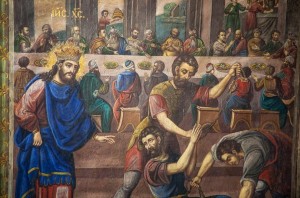How shall I, the unworthy, dare to enter the brilliance of Thy holy place? If I venture to enter into the bridal chamber, my garment will denounce me, for it is not a wedding garment, and I shall be cast out bound by the angels. Cleanse, O Lord, the defilement of my soul, and save me, for Thou art the Lover of mankind.
Every time a priest enters the Sanctuary at the beginning of a service, he prostrates before the Altar and says this prayer. The prayer calls to mind Christ’s parable of the man who is found at the wedding supper, after those who had been invited had refused to come; yet this man at the wedding is not wearing wedding clothes (which in ancient Semitic tradition were provide to the guest by the bridegroom). Although the man has harkened to the call of the servants sent out into the highways and the hedges to “compel” them to come in and although the man has indeed entered into the bridal chamber, he has not bothered to put on the clothes that the Bridegroom Himself has provided.
Just a cursory look at the New Testament Epistles reveals that to “put on” or to “clothe yourself in” are frequent admonitions. We are to clothe ourselves in Christ, or as it says in another place, in the New Man. We are to put off the old man. We are to put on the armour of God, which is righteousness, faith, the Gospel of peace, salvation and the Word of God. We are to put off anger, wrath, malice, blasphemy, and filthy language. We are to put on love, tender mercies, kindness, humility, meekness, and long suffering. These are all things we are to put on. The clothes that we have to take off and put on have to do with our attitudes and behaviour.
The clothing that our heavenly Bridegroom has provided is virtue. Virtue is not an ideal nor a legal position before God. Virtue, if it exists at all, exists as the quality, the godliness, the Christlikeness of a life lived. You might even say that the wedding clothes of the age to come, the clothes that we will be found wearing in the Bridal Chamber of the Heavenly Kingdom are precisely our life: what we actually lived, or strove to live, in Christ during our time in this life. At the moment of my death, all that I have imagined myself to be will pass away. All that will be left, the only clothing I will have after my death, is the life I actually lived, the clothing (provided by Christ) that I actually put on–or strove to put on.
A fearsome thought indeed.
However, “Strove to put on” is an important factor to keep in mind. God’s judgement is always according to intention, not necessarily actual performance. In this world, it often seems to be the case that the combination of natural ability/inability, training, circumstances, culture, demons and men is such that very little of the wickedness that I repent of goes away very easily, nor does much of the virtue I strive to obtain manifest itself in my life in any particularly noticeable way. It seems that I am the perpetual widow with only two spiritual mites. But whether it is two or two thousand, we give all we have. And that’s what is important.
Often after I pray the prayer above, I find myself humming the expostalation of matins the from Holy Week:
I behold your Bridal Chamber richly adorned, O my Saviour; but I have no wedding garment to worthily enter. Make radiant the garment of my soul, O Giver of Light, and save me.
Christ clothes those naked of virtue. Only need to want to be clothed. But here’s the catch: what I want is manifest not in what I think I want, or what I say I want, or what I confess I am supposed to want. What I want is manifested in what I actually strive to obtain (whether or not I am actually able to attain it in this messy world of sin). If what I want is Christ, if what I want is to put off the old man and put on the new, if what I want is to put off anger, malice and selfishness of all sorts and to put on patience and love and humility, then, if that’s what I really want, I will get what I want. Christ will give it to me. Christ has already given it to me. It is mine to put on.




















